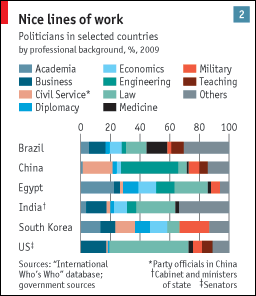It’s been suggested, more than once, that the public sector might run more efficiently if fewer elected officials were lawyers by trade. The examples below (from this 2009 Economist article) illustrate the prevalence of trained lawyers amongst politicians today. The underlying argument is that administrators and decision makers are most effective if they possess a comprehensive, systemic understanding of the machinations they oversee. In short, the public sector would benefit from an expanded perspective at the top level.
But is this narrow perspective unique to the public sector? Might private sector industries be similarly afflicted? Perhaps even entire fields of study?
How about business analysis at large?
There are no shortage of titles that include the words ‘business analysis’ in their job discription (Taken together, I’ll refer to this broad range of professionals as ‘traditional business analysts’) To be clear, businesses are assessed today from just about every conceivable angle. Our understanding of business models evolves along with the businesses themselves. But stifling habits are formed nonetheless; and habits, as we all know, are hard to break. More than habits, ‘traditions’ are formed, cementing themselves in formal practices. Today, the most trusted voices in the assessment of a business model is expected to be trained in X, Y and/or Z. And we continue to turn to these same ‘voices’ as the market evolves past their perspective.
But here’s the age-old problem: what if a relatively new factor, we’ll say ‘M’, becomes as vital to many business models as X, Y and Z? Nobody doubts the importance of M, but a new breed of professionals handles matters related to M. This factor is not considered by the ‘traditional’ business analysts (or they outsource that bucket of their assessment) In this example, the traditional business analysts role is suffering from a limited perspective.
I do believe that there are some noteworthy commonalities amongst business analysts today. More importantly, there are some noteworthy skills and training that might be under represented in the resumes of this class of professionals.
Let me back up a bit…
It’s true that many politicians understand their job, first and foremost, from a legal perspective. This fact is often seen as a root cause for entrenched bureaucracy and stifling litigiousness in government. This factor might prevent the public sector from being agile. The argument is that understanding legal channels might be vital for a public administrator, but that this is only one small piece of a much more complicated puzzle. It’s argued that the public sector would function more efficiently if a significantly higher percentage of elected officials had professional backgrounds and training in the fields such as, engineering, finance, computer science or medicine.

Here’s a question to consider:
How many business leaders understand how the web-based applications that drive their business are actually built?
That was kind of a trick question. Many of you might have guessed ‘quite a few’. If so, I think you’re right.
Many business leaders today wouldn’t have been able to rise to their positions without a thorough understanding of how their web-based tools are developed. Leaders, regardless of industry, must appreciate just how vital these tools are to their company’s bottom line; today, web-based applications often drive a business’s ability to generate revenue. Indeed, it’s no surprise that so many successful business leaders of the modern era come from a web development background (Bill Gates, Steve Jobs… you already knew this! Shall we move on?)
Don’t worry, I’m not trowing anybody under the bus here! Indeed, the rise of CIOs and CTOs underscore how many (larger) businesses have incorporated web development expertise into their top-level infrastructure.
But what about those traditional business analysts? What about the multitude of analysts who prognosticate, driving opinion on matters, including how new web-based innovations might affect the market? What about the traders and the bankers? What about marketers? What about the professionals who are meant to advise a business on the fundamental changes they might need to implement if they are to grow and compete?
The industries of speculation and finance are vast in scale, touching every industry. This doesn’t mean that they can’t be stifled by selective training and professional backgrounds. The Web Business Analyst (or, ‘Modern Business Analyst’) is a role many have already deemed to be amongst the most trusted new voices in business analysis at large.
The Web Business Analyst position is the crucial link between a modern business’s web-based needs, and how to actually build these tools. More often, these professionals are now simply called: ‘Business Analysts’.
But this new Business Analyst remains a class of professional whose voice remains underrepresented as we consider the future of individual businesses, and the market at large. The Business Analyst is a professional who understands both web development, as well us the fundamentals of classic business and organizational infrastructure. If web development is ‘M’, and ‘X,Y,Z’ represents the ‘traditional’ training for assessing business, the Business Analyst is trained in M, X, Y, and Z. They see a more comprehensive picture.
For smaller and medium-sized businesses, who often can’t possibly afford a full-time CIO, CTO, or web developer(s), there is a very urgent need for a class of professional such as the modern Business Analyst. Today, they find this professional at web development agencies, or even marketing agencies.
Web developers build today’s shopping malls and business complexes. They even build the avenues we travel between these web-based systems. Web developers have direct, hands-on experience building the most up-to-date tools for a wide variety of industry. They offer actual experience building the infrastructure and new business models of the day.
When the most successful business leaders are web developers, and the most successful business consultants heed the advice of experienced developers, why do so many trusted analysts not understand the building blocks of web development?
Today, business and web development are too often considered to be separate fields of study. Naturally, individuals who can speak both languages are amongst the most valuable business analysts of the day. In fact, these ARE the Business Analysts of the day.
Their influence will continue to grow.





